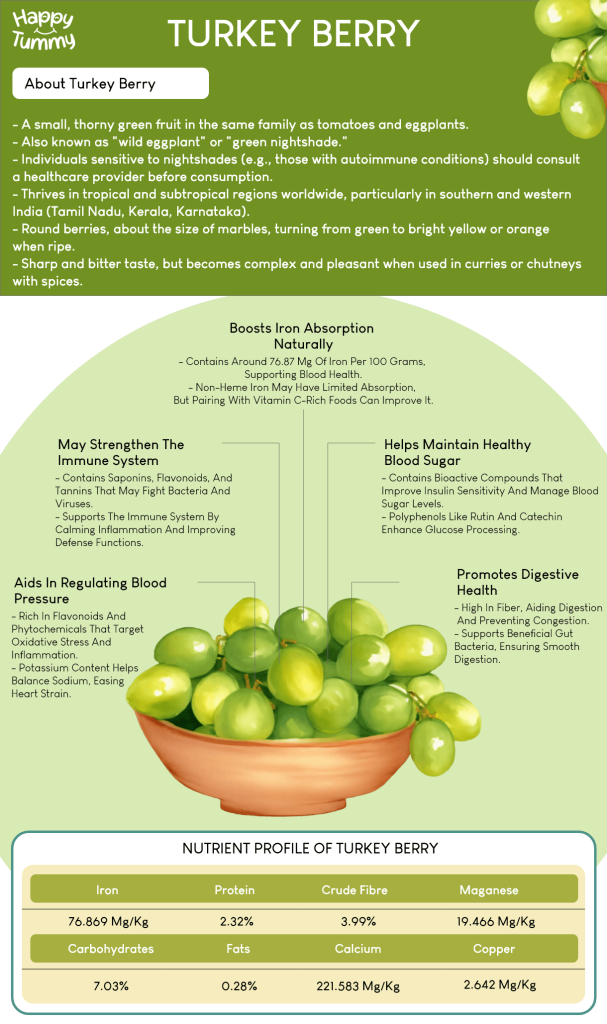Table of Contents
Picture a dainty berry, tiny enough to fit between your fingers yet mighty sufficient to transform your health—it’s Turkey Berry. This cherished herbal companion quietly deserves a seat at every mindful table.
You may reach for it for a meal, but its quiet mission is to strengthen your immunity, ease digestion, support blood health, and deliver what we now call a superfood experience.
In this post, we’ll unravel the small, daily steps to bringing this humble hero into your kitchen and, with it, into your brighter, livelier, healthier self.
Clear a space, the quiet power of Turkey Berry is ready to step forward and steal the spotlight you didn’t know it was waiting for.
About Turkey Berry
Turkey Berry, called Solanum torvum by scientists, is a small, thorny green fruit that grows on spiny bushes in the same family as tomatoes and eggplants.
People often call it “wild eggplant” or “green nightshade.” People sensitive to nightshades—like individuals with certain autoimmune conditions—are advised to take care and speak to a healthcare provider prior to eating these foods.
You’ll see it thriving in warm tropical and subtropical places around the world. In India, it’s a popular garden plant in the southern and western states, especially Tamil Nadu, Kerala, and Karnataka.
The berries are round and about the size of marbles, starting green and turning bright yellow or orange when they’re fully ripe. They grow in clusters and resemble little eggplants.
Turkey Berry has a sharp, bitter taste that can stand out in a dish, but it becomes more complex and pleasant when added to curries or chutneys, where spices round out the flavor.

Nutrient Profile of Turkey Berry
Turkey Berry is mostly water, but it also packs a good number of vitamins and minerals. Here’s a closer look at what it gives you:[1]
| Nutrient | Amount |
| Carbohydrates | 7.03% |
| Proteins | 2.32% |
| Fats | 0.28% |
| Ash | 0.14% |
| Crude Fiber | 3.99% |
| Iron | 76.869 mg/kg |
| Manganese | 19.466 mg/kg |
| Calcium | 221.583 mg/kg |
| Copper | 2.642 mg/kg |
| Zinc | 21.460 mg/kg |
| Vitamin A | 0.078 mg/100g |
| Vitamin C | 2.686 mg/100g |
Turkey Berry is packed with iron, which is great if you’re looking to support your iron levels for healthier blood.
Health Perks of Turkey Berry: Small Fruit, Big Benefits.
Do not be lured into the belief that Turkey Berry is a simple, trendy fruit; it is not.
These small green pearls will make people turn their heads, and with a good reason, because they can promote wellness in our bodies from the scalp to the toes.
#1 Aids In Regulating Blood Pressure
Have you ever thought that a small berry may help you manage blood pressure? Yeah, yes, says Turkey Berry.
Favonoids and other phytochemicals are found in their dense form, that may be described as mini-cleaning teams that target oxidative stress and tame bothersome inflammation. [2]
As the feeling of relaxation is found in the blood vessels and tension levels decrease, the blood pressure tends to relax in the same way. It is not all the end of it!
Turkey Berry also comes equipped with potassium. [3] It is a sodium-balancing friend in that it makes your heart pump without feeling strain.
Initial studies suggest that sprinkling Turkey Berry over your plate or making a tea with it could offer a natural, supportive way to help maintain healthy blood pressure levels.
However, it should be viewed as a complementary food, not a treatment.
#2 May Strengthen the Immune System
Can Turkey Berry give your immune system a quiet but solid thumbs-up? This small, unshowy berry has surprised scientists with its microbe-fighting tricks.
Brimming with saponins, flavonoids, and tannins, Turkey Berry sends out a squad of natural defenders that may track down and turn off bacteria and viruses. [4]
When the berry finds its way into your soup, stir-fry, or evening tea, it sharpens your body’s detective skills, helping it spot and stomp on nasty germs that try to crash the party.
Turkey Berry is a teeny weeny green fruit carrying gigantic advantages. Studies inform us that antioxidants are used to calm inflammation, and the immune system runs smoothly.
Eating a handful of these berries regularly will be equivalent to enrolling your immune system in an eternal boot camp.
#3 Promotes Digestive System
Have you ever wondered about what a small berry can do to calm that upset tummy? Turkey Berry is abounding in fibre and is the unacknowledged champion of the gut—the fibre sways, pushing all before it so you avoid laziness and congestion. [5]
Better yet, Turkey Berry promotes beneficial gut germs and gets your body digesting like an efficient machine.
So, next time your stomach feels out of sorts, consider reaching for Turkey Berry to support your digestive health and keep things running smoothly.
Aashirvaad Atta, Multigrains, and its highly qualified nutritionists created the My Meal Plan test. This test determines how much fibre you consume each day and generates a personalised food plan that meets your needs.
#4 Helps Maintain Healthy Blood Sugar
Is it possible to maintain blood sugar with the help of Turkey Berry? Absolutely. It is a small fruit that contains bioactive compounds that assist your body in coping with glucose.
Studies indicate that the polyphenols, and especially rutin and catechin, of Turkey Berry have the potential to increase insulin sensitivity and manage blood sugar. [6] [7]
Plus, some animal research suggests turkey berry extracts may help regulate blood sugar, likely due to polyphenols and fibre. However, this does not replace diabetes medication.
#5 Boosts Iron Absorption Naturally
If you’re keeping an eye on your iron levels, let Turkey Berry earn a spot on your plate. This small, tart fruit packs around 76.87 mg of iron for every 100 grams, making it a simple way to strengthen your blood.[8]
Turkey berry contains fair iron, but absorption is limited since it is non-heme iron. Pairing with vitamin C-rich foods may improve absorption. It may support iron intake, but should not be relied on solely to prevent anemia.
Plus, Turkey Berry is a solid source of vitamin C, which your body needs to absorb all that iron.
By adding Turkey Berry to your meals regularly, you can help keep iron-deficiency anemia at bay, especially if other iron-rich foods haven’t been your go-to.
Culinary Uses of Turkey Berry
Ever thought that Turkey Berry can spice up your food?
Although it is of small size, Turkey Berry gives a different taste to food, particularly in the traditional South Asian cuisines. It has a slightly bitter flavor that is balanced off by cooking and, therefore, is versatile as an ingredient in savoury preparations.
- Sambar- A South Indian soup of lentils in which Turkey Berry is cooked along with tamarind, lentils, and a spice mix to produce a very flavourful and tangy taste.
- Chutney- The combination of Coconut, red chilies, and spices mixed with the Turkey Berry is ideal to eat as a chutney with rice or flatbreads.
- Stir-Fry– The berries are sauteed with mustard seeds, garlic, onions and green chilies, giving way to an easy-tasting side dish.
- Cooking Tip: One can soften the bitterness of Turkey Berries either by soaking them in water and cooking afterward or frying them until they become golden brown. This also allows the berry to reveal its delicate, earthy taste, and thus it serves perfectly well as an inclusion in a savory dish.
The Last Say
As a small fruit that most people do not pay much attention to, Turkey Berry has several health advantages attached to it.
Being rich in necessary vitamins, minerals, such as iron, antioxidants, and fibre, it has many benefits, including might be supporting the immune system and digestion, as well as supporting the management of normal blood pressure and blood sugar levels.
Easy to add to your at-home diet, it is versatile in the kitchen, in South Asian dishes, and as part of curries, chutneys, or stir-fries.
Still, though Turkey Berry can be a strong ally on the way to an improved state of your health, you should keep in mind that a balanced diet is the primary key to your well-being.
The inclusion of a number of healthy foods will make sure that you have a healthy way of living.
Great care should be taken to discuss significant changes to a diet with a medical practitioner or dietician, particularly in cases where health problems already exist.
Frequently Asked Questions
Turkey Berry is a green nightshade fruit that is small in size. It grows naturally in a tropical and subtropical climate, especially in India, where the trees grow in the southern and western parts of the country, like Tamil Nadu and Kerala. It is commonly grown in backyards and markets.
Iron, antioxidants, and major minerals are rich in Turkey berry.
It may support the immune system, maintain blood pressure, improve the digestive tract, and control blood sugar levels.
Turkey Berry is consumed in South Indian food. It is usable as an add-in on curries, sambar, stir-fries, and chutneys. It can be combined with other spices, such as turmeric, mustard seeds, and curry leaves, to even out its slightly bitter flavour on cooking.
Although Turkey Berry is harmless to the majority of individuals, it is best to take it in moderate doses as part of a healthy diet regimen.
Allergy or sensitivity to nightshade vegetables is another factor to consider, since it might be best to consult a healthcare professional to add it to your diet.
Turkey Berry is extensively used in India as it is found in most domestic markets, notably South Indian States such as Tamil Nadu, Kerala, and Karnataka.
You may buy it fresh at vegetable stalls, especially in rural or semi-urban areas. You could also get it at supermarkets that carry local or organic foods.
















